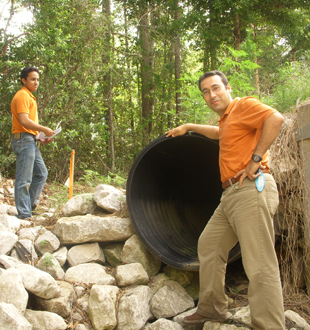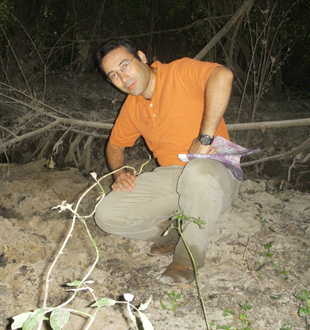| Future Students | Students | Scholars & Faculty | Alumni & Global Community | Donate |
Turkish Professor Helps University, State with Hydrology Research
AUBURN – The journey of Latif Kalin's life could have taken him many places, but fortunately for the university and the state of Alabama, he chose a path that brought him to Auburn University.
Kalin serves as an associate professor of forest hydrology as well as an adjunct professor of biosystems engineering at Auburn. His expertise in hydrology is well-established, but when arriving in the U.S. to study at Purdue for his master's and doctorate in civil engineering, hydrology was among several concentrations from which to choose.
"When you think about civil engineering, water is probably the one that is closest to nature. I always felt close to it, and I always did well in water-related courses. So I started my M.S. in water," Kalin said.
Despite not being the popular subject area in engineering at that time, it proved to be a wise decision. "I love it because it is such an intertwining field. I work with economists; I work with ecologists; I work with social scientists. It is such a broad field, and it gives me an opportunity to work with people from very different backgrounds," Kalin explained.
Kalin, a native of Kaysery, Turkey, took a large leap of faith to even be in the United States. He got his bachelor's degree in engineering from Middle East Technical University in Ankara and worked as an engineer in his native country but came to the United States 15 years ago to further his studies with his wife and a son who was only two months old at the time in tow.
After finishing at Purdue, he did approximately four years of postdoctoral work at the Environmental Protection Agency in Cincinnati. He then started a search for more permanent employment.
"I was at a crossroads. I had an offer from a consulting company in Tampa as a senior engineer, and I also had an offer from Auburn University as a faculty member," Kalin said. "I had to decide do I go into academia or industry. Of course industry pays much better, but still I thought about all the plusses and minuses. Today, I know I made the right decision."
But he had some reservations about making that move, too.
"I was in Cincinnati, which is a relatively big city. People living in the North kind of have some misconceptions about the South. I saw the job advertisement in Alabama, and people said, 'Oh, you are going there?' When I came, I loved it. I told my wife it is the place to live. I fell in love with Auburn," Kalin said.
Now in his sixth year at Auburn, Kalin teaches graduate level courses in forest hydrology and nonpoint-source pollution modeling. Nonpoint-source pollution is pollution that does not come from a single, fixed location. Rainwater runoff is an example.
Kalin's research mostly focuses on landscape change and its effect on water sources, particularly when forested areas come under human development.
"My research, broadly speaking, is what happens to water sources, in terms of quantity and quality, when land use and land cover changes," Kalin explained. "Mostly, we do modeling work, but we really look at the broad spectrum of drought issues, flooding issues and also pollution.
"Plus one of the issues we try to look at is if there is a plan to develop an area, how do we sustainably build up that area in a way that has minimal impact."
Kalin also is currently working on a few grants. One from the EPA involves developing a model that accounts for how much pollution wetlands are able to treat and clean. "Wetlands are known to be nature's kidneys. They treat water and act as a natural filter," Kalin said.
A grant from the National Oceanic and Atmospheric Administration's Mississippi-Alabama Sea Grant Consortium focuses on causing minimal impact during the development of coastal areas. The Forest Service grant studies the link between urbanization and mosquitoes carrying the West Nile virus.
As issues like coastal development, wetland health and West Nile virus continue to grow in importance in Alabama, it is clear Kalin is right where he needs to be.
Last Updated: January 22, 2013






